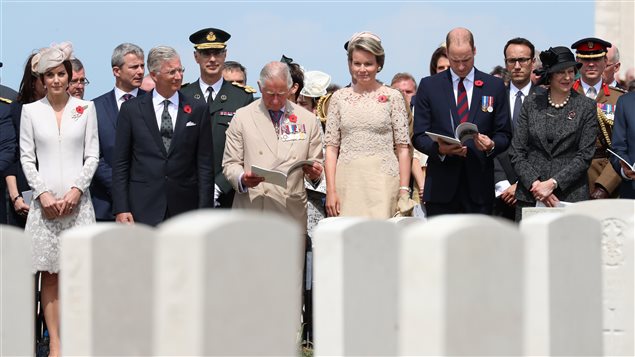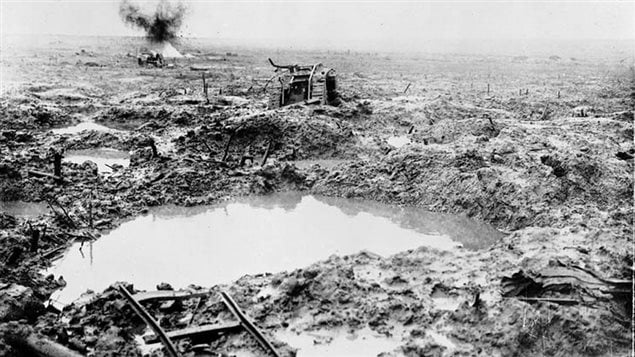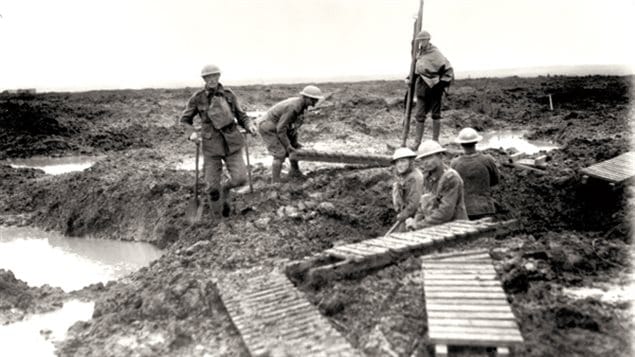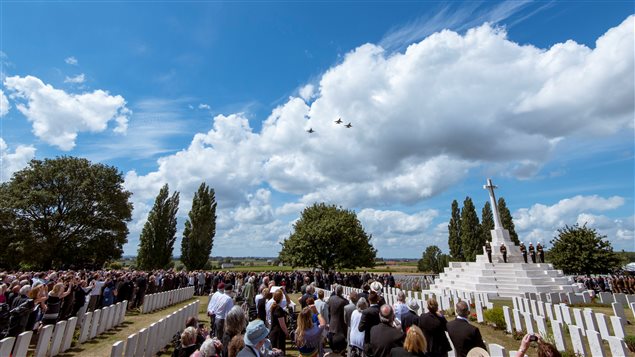Representatives of the British and Belgian royal families, Germany’s foreign minister and descendants of some of those who died in one of the First World War’s bloodiest battles gathered Monday in western Belgium to mark the centenary of the Third Battle of Ypres, more commonly known simply as Passchendaele.
More than half a million Allied and German troops, including 16,000 Canadians, were killed or wounded in the fields of Passchendaele that had become a sea of heavy mud with the incessant artillery fire having destroyed dikes and drainage ditches which normally kept the ground dry.
Early and heavy rains only made the situation worse as the ground turned into a nightmarish landscape poked with craters of fetid water often filled with the bodies of the fallen.
Gathered at the Tyne Cot Cemetery, where almost 12,000 soldiers are buried, representatives from nations whose soldiers fought, and members of their families, paid homage to those who died.

The Canadian government at today’s Passchendaele Commemorations was represented by Ambassador Olivier Nicoloff.
Veterans Affairs Canada is currently working on commemorative activities related to the 100th anniversary of the Battle of Passchendaele in November, said Nick Wells, a spokesperson for the department.
“In addition to events here in Canada, there will be a ceremony in Belgium with a Canadian delegation that will include Veterans, youth, representatives of regimental and Indigenous organizations, as well as a contingent of Canadian Armed Forces,” said Wells.
“These ceremonies are being organized to commemorate the Canadian elements of the Battle of Passchendaele.”
Canadians entered the Battle of Passchendaele in October 1917.

The Canadians were sent to Belgium to relieve the British, Australian and New Zealand (ANZAC) forces and take part in the final push to capture Passchendaele.
The Canadian offensive began on October 26, 1917 and by the end of the second attack, the Canadians had reached the outskirts of Passchendaele on October 30.
On November 6, the Canadians finally took the shattered village in the face of withering resistance and counter-attacks. By November 10, they had pushed the Germans off the nearby ridge, succeeding in mere weeks, where the British and ANZAC forces had failed during a horrific campaign of several months.

Canadians paid a heavy price for their victory with 4,000 dead and almost 12,000 wounded.
Nine Canadians earned the Victoria Cross (the highest award for military valour a Canadian can earn) in the battle: Private Tommy Holmes, Captain Christopher O’Kelly, Sergeant George Mullin, Private James Peter Robertson, Corporal Colin Barron, Private Cecil Kinross, Lieutenant Hugh McKenzie and Lieutenant Robert Shankland. Two of these men, MacKenzie and Robertson, did not survive the battle to receive their medals.
German Foreign Minister Sigmar Gabriel said “the battle of Flanders stands like Verdun for the senseless horror of war.”
“Diplomacy must never again fail as it did in 1914, there must never again be war in the middle of Europe, and never again must the youth of our continent be slaughtered,” Gabriel said in a statement.
With files from The Associated Press and Marc Montgomery of Radio Canada International







For reasons beyond our control, and for an undetermined period of time, our comment section is now closed. However, our social networks remain open to your contributions.